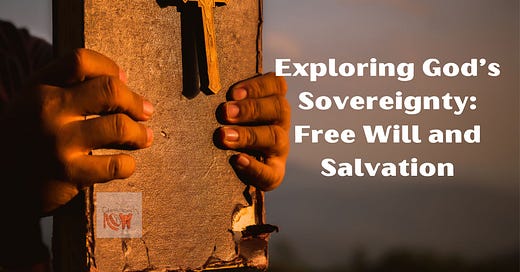Exploring God’s Sovereignty
Free Will and Salvation
A critical examination of Reformed Theology/Calvinism (RT/C) reveals significant theological challenges, particularly concerning the nature of God’s sovereignty. A clear understanding of God’s character and will is essential to address the misinterpretations presented by RT/C. This exploration seeks to affirm the Biblical representation of God’s sovereignty aligned with His nature and will.
The Nature of God
God’s nature is epitomized by complete harmony and perfection, as articulated in Matthew 5:48, which describes God as perfect. This perfection is not merely an attribute but the essence of His being, compelling Him to act consistently with His nature. Hence, God cannot engage in behaviors such as lying, which contradicts His nature of truth (Titus 1:2). This inability to lie is not due to a lack of capability but a voluntary adherence to His perfect nature. RT/C proponents often overlook this aspect, erroneously suggesting a deity capable of contradicting its own essence.
The Will of God
The divine will expresses God’s desires and intentions for creation. Scripture reveals that from the foundation of the world, God intended to unite humanity in Christ within the Church (Ephesians 1:10; 3:1-11). The salvation narrative woven throughout the Bible highlights God’s desire for all individuals to come to repentance and avoid perishing (1 Peter 3:9), underscoring God’s impartiality in salvation (Acts 10:34-35). Contrarily, RT/C asserts a predetermined selection for salvation and condemnation, which conflicts with the universally inclusive will of God.
The Sovereignty of God
Sovereignty implies supreme authority and control. God’s sovereignty encompasses His authority over all creation, yet it does not imply micromanagement of every human decision. For instance, mundane choices like turning left instead of right demonstrate human free will within God's sovereign framework. God’s will, particularly concerning the sacrifice of His Son, Jesus Christ, underscores a complex interplay between divine intention and human action. The crucifixion, while not desired by God in a conventional sense, was necessary for the redemption of humanity, aligning with God’s ultimate will of salvation through sacrifice.
God’s Sovereignty and Human Free Will
The intersection of divine sovereignty and human free will remains a profound mystery to those unwilling to understand the interplay between His will and Word. God’s unlimited power is self-regulated by His Word—the Divine Logos as discussed by thinkers like Jordan Peterson. This self-imposed limitation ensures that God’s actions remain consistent with His declarations, such as the promise never to forsake us (Hebrews 13:5). Thus, while God wills all to be saved, the realization of this will is contingent upon individual human response. RT/C’s viewpoint that God selectively wills individuals' salvation contradicts the universal and inclusive nature of God’s declared will and expressed desire for all to be saved.
Conclusion
The doctrine of RT/C portrays a deity at odds with its nature, undermining the true essence of God’s sovereignty. In contrast, the Biblical portrayal of God reveals a sovereign who empowers human choice without compromising divine purposes. The true God, as revealed in Scripture, offers salvation universally, respecting human autonomy in alignment with His perfect will. This depiction not only upholds God’s justice but also magnifies His sovereignty, presenting a God who is truly powerful enough to achieve His purposes through and with the free responses of His creation. Therefore, the choice stands clear: the limited god of RT/C or the omnipotent Jehovah God, whose power and justice extend to the ultimate salvation of mankind.




Through the influence of the Holy Spirit, the most wretched sinner can accept Grace. But not all choose to do so. If the Holy Spirit acts impartially in all of us, then I suppose our resistance, or our temporary resistance, illustrates the complex interplay between human free will and God's sovereignty. Those who are saved in this way display an openness that others appear to lack through sin and through absorption in worldly pursuits. Their openness is a manifestation of their free choice. But others' lack of that openness does not seem to reflect free will, but rather thralldom. Should we conclude that thralldom to the things of the world is freely chosen?